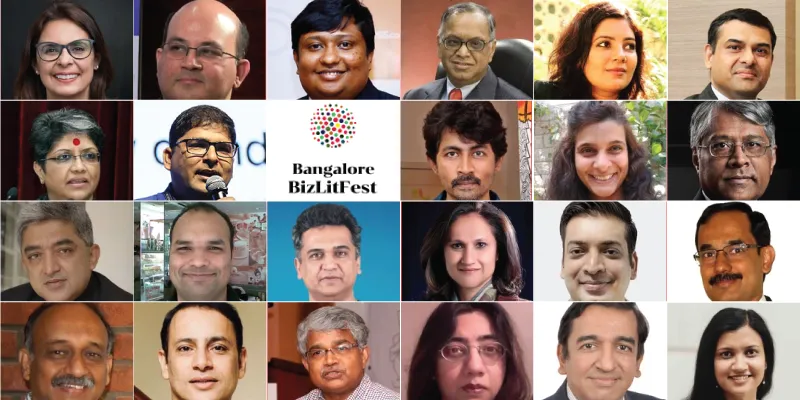Stories, startups, and scripts – meet the authors at Bangalore Business LitFest 2019
The fifth annual Bangalore Business Literature Festival (BBLF) will be held at WeWork Galaxy on September 7, featuring a range of insights on entrepreneurship, employment, and storytelling.
Over the previous four editions, BBLF has hosted more than 50 authors from across the country. The stellar speaker lineup this year includes Infosys co-founder Narayana Murthy (author of A Better India A Better World), branding expert Harish Bijoor, Games2Win founder Alok Kejriwal, YourStory founder Shradha Sharma, R. Jagannathan (author of The Jobs Crisis in India), and 20 others.

In Part I of our festival preview coverage, we feature insights from four speakers on entrepreneurship, storytelling, the gig economy, and publishing trends. See my writeups on the earlier editions of the festival in 2018 (storytelling, founder tips), 2017 (entrepreneurship, failure insights, founder stories), 2016 (grassroots entrepreneurship, startup ecosystems) and 2015 (business models, startup boom, storytelling).
“The Café Coffee Day founder VG Siddhartha’s recent demise has raised important questions on business pressures on entrepreneurs,” explains Benedict Paramanand, BBLF Founder, and publisher of Management Next. The festival is intended to surface key challenges and success factors for business leaders in India, and opportunities for business authors and publishers.
Starting up
One of the common misconceptions about entrepreneurship is that one must raise venture capital in order to succeed. “Startups like Zerodha, Zoho, Wingify, and Atlassian have proven that it is possible to grow and become huge without raising any external capital,” explains Nistha Tripathi, author of No Shortcuts: Rare Insights from 15 Successful Startup Founders.
“It helps to have this mindset from the start that success comes from a good product-market fit and not from fund-raising. One should seek external funding only after an initial validation and when it is clear how capital can help in scaling,” she explains. Nistha is a startup founder herself, having started Scholar Strategy in 2013 (see earlier YourStory coverage here).
Nistha also offers tips for busy entrepreneurs hard-pressed for time to learn and read. “More than quick reading, I believe in retaining what you read. For this, one slow read with a lot of highlighting followed by a second reading of the highlighted parts reinforces the important concepts in the mind,” she advises.
Storytelling
In a world of information overload, storytelling helps a company stand out. “The information overload has led to low attention spans. There are also constraints on the 'memory space’ available in our brains. Facts are forgotten, stories are remembered,” says Ameen Haque, Founder, Storywallahs.
Human brains are hardwired to remember stories. There are three ways storytelling helps, Ameen explains. Firstly, they make the message memorable. “Secondly, it is not what we say but also how we say something that makes a lot of difference. A good story helps one stand out from the clutter by focussing on both the what and how,” he says.
Finally, in an increasingly transactional world, stories help brands and organisations forge an emotional connect. Storytelling can also be woven with data to present facts in a more compelling manner.
“In any case, we respond to data emotionally. Think about some data points here: rate of attrition, increment, sales numbers, profits, share price, price of a product, and discount. All of the above are numbers and data, but we respond emotionally to these numbers,” Ameen explains.
Some people think stories are from Venus and data is from Mars, that they are like chalk and cheese, Ameen jokes. “However, in business, a good story often has to be built on the foundations of data. And that’s what a good storyteller does: weaves numbers into a story using narrative principles and data visualisation,” he clarifies.
“Here’s an example: I can say 35 percent of this village lives below the poverty line or I can say every third person in this city lives below the poverty line. Both are technically correct but the second makes a bigger impact. A good storyteller knows ‘how’ you say something is as important as the ‘what,’” Ameen emphasises.
The gig economy
“The gig economy has always existed in India's farm and informal sectors. People used to get work only at certain times in the year, and not always. Nor did they have social security,” explains Raghavan Jagannathan, author of The Jobs Crisis in India. He has over 40 years of experience across Indian media, and is the Editorial Director of Swarajya magazine.
When we say in future more jobs will come only in the gig economy, what we mean is that the middle class, middle income, stable, and predictable jobs are disappearing fast. “This means those who previously could expect stable jobs and regular income and career growth will have to repeatedly upskill themselves in order to find work every few years,” Jagannathan says.
Many jobs will become contractual and project-based in future. “The only really non-gig regular jobs will be in the government or very large corporations. In the case of large firms, their longevity is already being shortened, and this means there will be regular right-sizing, downsizing, and pink slips to reckon with. Even regular jobs with big companies cannot be taken for granted as they merge, acquire, and amalgamate to reap economies of scale to stay competitive,” he adds.
In the startup sector, which will provide most of the new jobs, an estimated 70-80 percent will fail, which again means there can be no job permanence, Jagannathan cautions. “Furthermore, the modern economy is providing lots of jobs that are dependent on output - like your pizza and Flipkart and Amazon delivery staff,” he adds.
Such jobs are aplenty, and they even pay reasonably well, but earnings depend on output, and the work is back-breaking. “No one will want to do these jobs except as short-time gigs,” Jagannathan predicts.
Self-publishing
In the digital and print world, self-publishing has emerged as a feasible option for a range of authors. “From a reader’s perspective, there have never been credibility issues as most readers do not look at who published the book before buying it,” explains Naveen Valsakumar, CEO of Notion Press.
Readers usually look for visual cues like design and presentation quality and social proof like reviews, familiarity of the author, and relatability to the problem statement. “While self-publishing may have eliminated the roadblocks for writers in getting published, it doesn’t mean compromising on creating a good book or on building a strong author platform,” he adds. Authors who treat their book authoring as a business are more likely to be successful.
As self-publishing trends in India, Naveen observes that there is a huge spike in non-fiction and business book publishing. “There are more subject matter experts in India aspiring to become thought leaders in their domain and get more speaking or consulting gigs. A book helps build credibility,” he explains. Due to clear USP, takeaways, and the credibility of the subject matter expert, these books tend to sell well.
“Fiction and romance is still the largest segment in self-publishing followed by poetry. There are so many Instagram poets who have built a strong audience and are looking to leverage this by publishing their poems. Cookbooks too have increased due to the Instagram effect,” Naveen observes.
“Audiobooks are yet to create an impact due to the high cost of production and the effort required,” he cautions. Writers are naturally gravitating towards more conversational formats like podcasts and videos to build their author brand.
In addition to insightful panels on these topics, the festival will present the BBLF CK Prahalad Best Business Book Award 2019. The award, launched in 2018, offers a cash prize of Rs 1 lakh. The prize is sponsored by the family of late Professor C K Prahalad, a global management guru (see the quotes compilation here: ‘You cannot lead unless you are future-oriented’ - 35 quotes from business guru C.K. Prahalad).
In 2018, the award was won by Subroto Bagchi, Co-founder of MindTree for his book Sell: The Art, the Science and Witchcraft (see my book review here). The 2019 award will be presented by Narayana Murthy, with the jury comprising Prof. Rishikesha Krishnan, Faculty at IIM Bangalore; brand expert Harish Bijoor; and senior journalist K Giriprakash.
(Edited by Saheli Sen Gupta)








